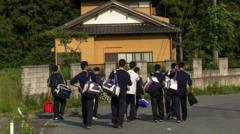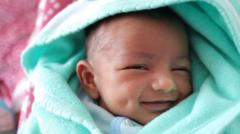A survey reveals that a significant number of Japanese teenagers, particularly boys, are missing out on traditional experiences such as kissing and sexual relationships. Experts speculate that the COVID-19 pandemic has influenced these trends, contributing to Japan’s ongoing demographic challenges amid one of the world's lowest birth rates.
Japan's Youth Face Declining Romantic Milestones Amidst Societal Shifts

Japan's Youth Face Declining Romantic Milestones Amidst Societal Shifts
A recent survey highlights a concerning decline in first kisses and sexual experiences among Japanese teenagers, paralleling the country’s struggle with low birth rates.
Recent findings indicate a troubling trend among Japanese teenagers concerning romantic experiences. A survey conducted by the Japan Association for Sex Education (Jase) found that a staggering 80% of boys aged 15-18 have never kissed, while only about 25% of high school girls have experienced their first kiss. These statistics represent the lowest levels recorded since the surveys began in 1974. The implications of these findings come as Japan grapples with one of the lowest birth rates globally.
The survey questioned over 12,500 students from junior high schools, high schools, and universities about various aspects of their sexual development. The latest results demonstrate a consistent decline in first kisses since 2005 when the figures were approximately 50%. The report revealed that there was not only a drop in kissing practices but also in sexual intercourse rates among teenagers. For instance, the percentage of high school boys reporting sexual experiences decreased to just 12%, while for girls, it dropped to 14.8%.
Experts, including Yusuke Hayashi, a sociology professor, have pointed to the COVID-19 pandemic's influence on these results, suggesting that school closures and restricted physical interactions during a crucial developmental period greatly affected the expression of sexuality among youth. The survey noted a striking uptick in the number of teenagers who acknowledged engaging in masturbation, indicating a nuanced shift in sexual behavior.
This decline in early romantic experiences coincides with a broader concern in Japan regarding its demographic future. Recent reports indicate that nearly half of all marriages in Japan are sexless, contributing to fears that the declining birth rate could threaten societal stability. Former Prime Minister Fumio Kishida warned of dire consequences, suggesting the country's population, currently around 125 million, might plummet to below 53 million by the century’s end.
Multiple factors are believed to contribute to these demographic trends, including rising living costs, increased access to education, and greater contraceptive availability, allowing women the choice to have fewer children. Additionally, Japan holds the title for the world's oldest population, a fact underscored by reports that one in ten residents is now aged 80 or older. In a significant cultural shift, Oji Holdings recently announced they would cease production of baby diapers, redirecting resources to adult diapers instead.
As Japan continues addressing its declining birth rate, the role of youth attitudes toward relationships and sexuality may be a vital focal point for future efforts.



















